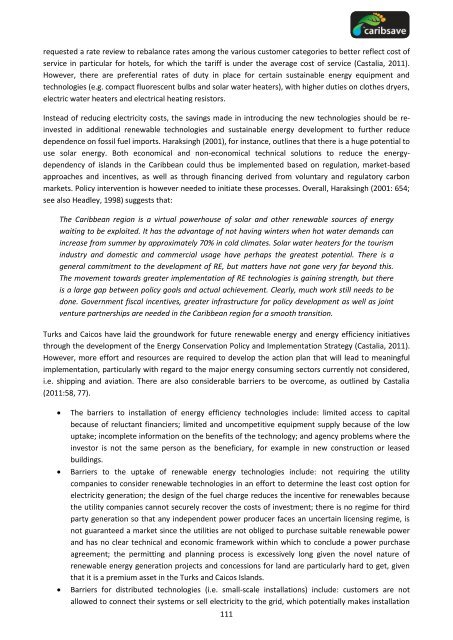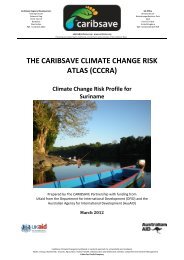Create successful ePaper yourself
Turn your PDF publications into a flip-book with our unique Google optimized e-Paper software.
equested a rate review to rebalance rates among the various customer categories to better reflect cost of<br />
service in particular for hotels, for which the tariff is under the average cost of service (Castalia, 2011).<br />
However, there are preferential rates of duty in place for certain sustainable energy equipment <strong>and</strong><br />
technologies (e.g. compact fluorescent bulbs <strong>and</strong> solar water heaters), with higher duties on clothes dryers,<br />
electric water heaters <strong>and</strong> electrical heating resistors.<br />
Instead of reducing electricity costs, the savings made in introducing the new technologies should be reinvested<br />
in additional renewable technologies <strong>and</strong> sustainable energy development to further reduce<br />
dependence on fossil fuel imports. Haraksingh (2001), for instance, outlines that there is a huge potential to<br />
use solar energy. Both economical <strong>and</strong> non-economical technical solutions to reduce the energydependency<br />
of isl<strong>and</strong>s in the Caribbean could thus be implemented based on regulation, market-based<br />
approaches <strong>and</strong> incentives, as well as through financing derived from voluntary <strong>and</strong> regulatory carbon<br />
markets. Policy intervention is however needed to initiate these processes. Overall, Haraksingh (2001: 654;<br />
see also Headley, 1998) suggests that:<br />
The Caribbean region is a virtual powerhouse of solar <strong>and</strong> other renewable sources of energy<br />
waiting to be exploited. It has the advantage of not having winters when hot water dem<strong>and</strong>s can<br />
increase from summer by approximately 70% in cold climates. Solar water heaters for the tourism<br />
industry <strong>and</strong> domestic <strong>and</strong> commercial usage have perhaps the greatest potential. There is a<br />
general commitment to the development of RE, but matters have not gone very far beyond this.<br />
The movement towards greater implementation of RE technologies is gaining strength, but there<br />
is a large gap between policy goals <strong>and</strong> actual achievement. Clearly, much work still needs to be<br />
done. Government fiscal incentives, greater infrastructure for policy development as well as joint<br />
venture partnerships are needed in the Caribbean region for a smooth transition.<br />
<strong>Turks</strong> <strong>and</strong> <strong>Caicos</strong> have laid the groundwork for future renewable energy <strong>and</strong> energy efficiency initiatives<br />
through the development of the Energy Conservation Policy <strong>and</strong> Implementation Strategy (Castalia, 2011).<br />
However, more effort <strong>and</strong> resources are required to develop the action plan that will lead to meaningful<br />
implementation, particularly with regard to the major energy consuming sectors currently not considered,<br />
i.e. shipping <strong>and</strong> aviation. There are also considerable barriers to be overcome, as outlined by Castalia<br />
(2011:58, 77).<br />
The barriers to installation of energy efficiency technologies include: limited access to capital<br />
because of reluctant financiers; limited <strong>and</strong> uncompetitive equipment supply because of the low<br />
uptake; incomplete information on the benefits of the technology; <strong>and</strong> agency problems where the<br />
investor is not the same person as the beneficiary, for example in new construction or leased<br />
buildings.<br />
Barriers to the uptake of renewable energy technologies include: not requiring the utility<br />
companies to consider renewable technologies in an effort to determine the least cost option for<br />
electricity generation; the design of the fuel charge reduces the incentive for renewables because<br />
the utility companies cannot securely recover the costs of investment; there is no regime for third<br />
party generation so that any independent power producer faces an uncertain licensing regime, is<br />
not guaranteed a market since the utilities are not obliged to purchase suitable renewable power<br />
<strong>and</strong> has no clear technical <strong>and</strong> economic framework within which to conclude a power purchase<br />
agreement; the permitting <strong>and</strong> planning process is excessively long given the novel nature of<br />
renewable energy generation projects <strong>and</strong> concessions for l<strong>and</strong> are particularly hard to get, given<br />
that it is a premium asset in the <strong>Turks</strong> <strong>and</strong> <strong>Caicos</strong> Isl<strong>and</strong>s.<br />
Barriers for distributed technologies (i.e. small-scale installations) include: customers are not<br />
allowed to connect their systems or sell electricity to the grid, which potentially makes installation<br />
111





